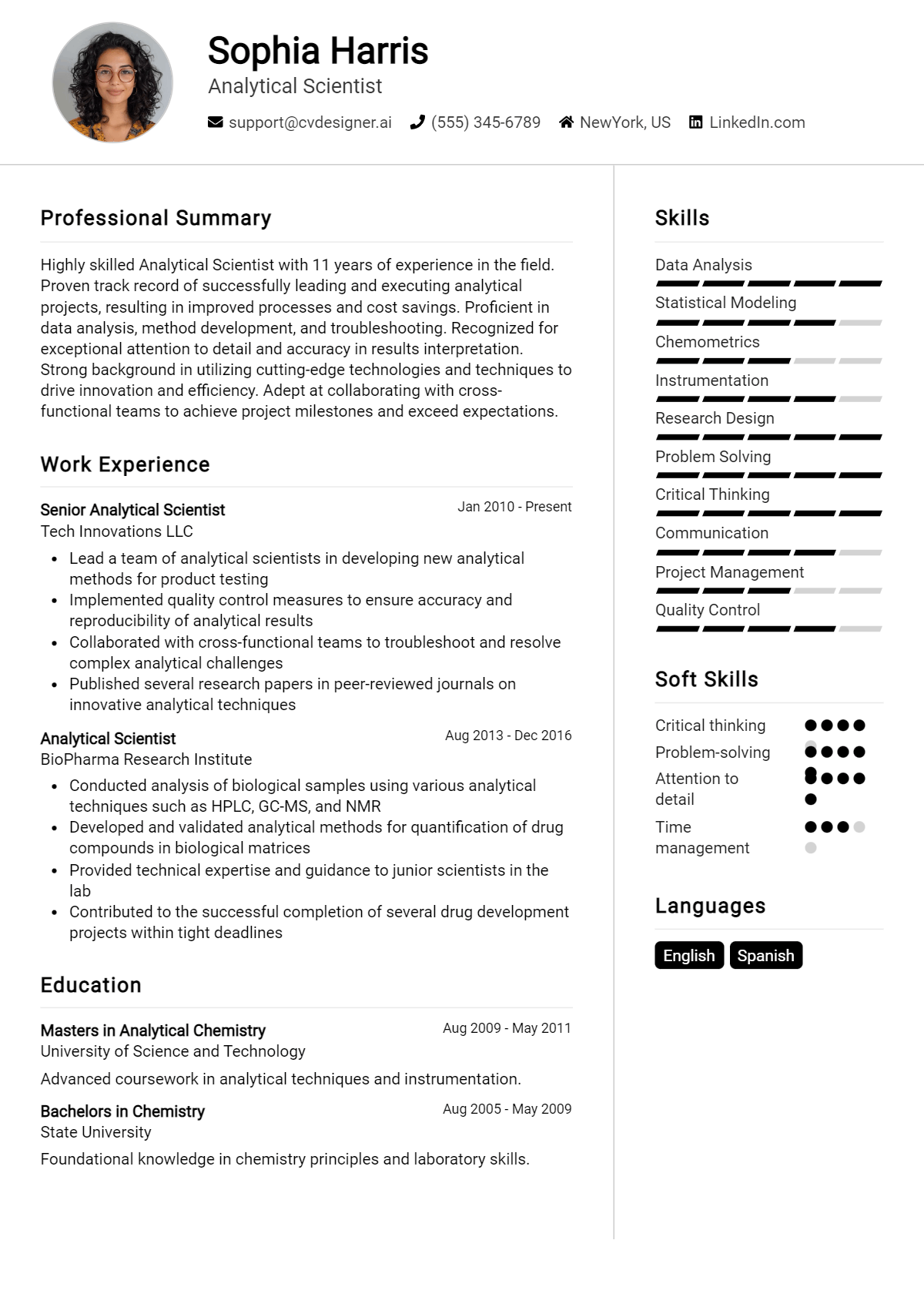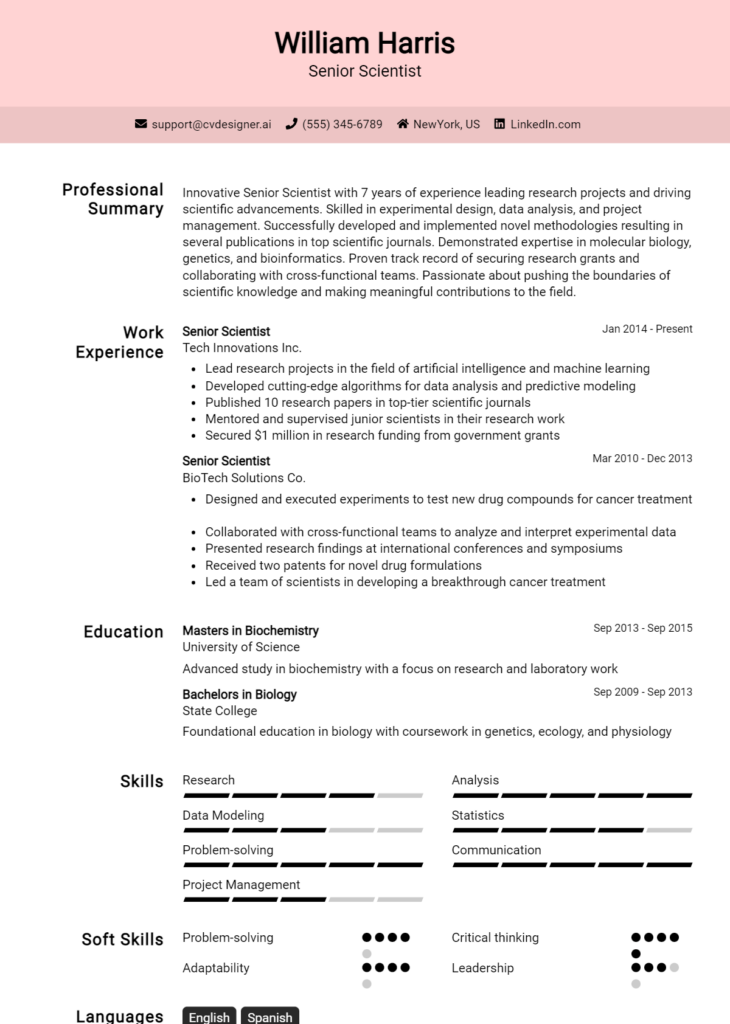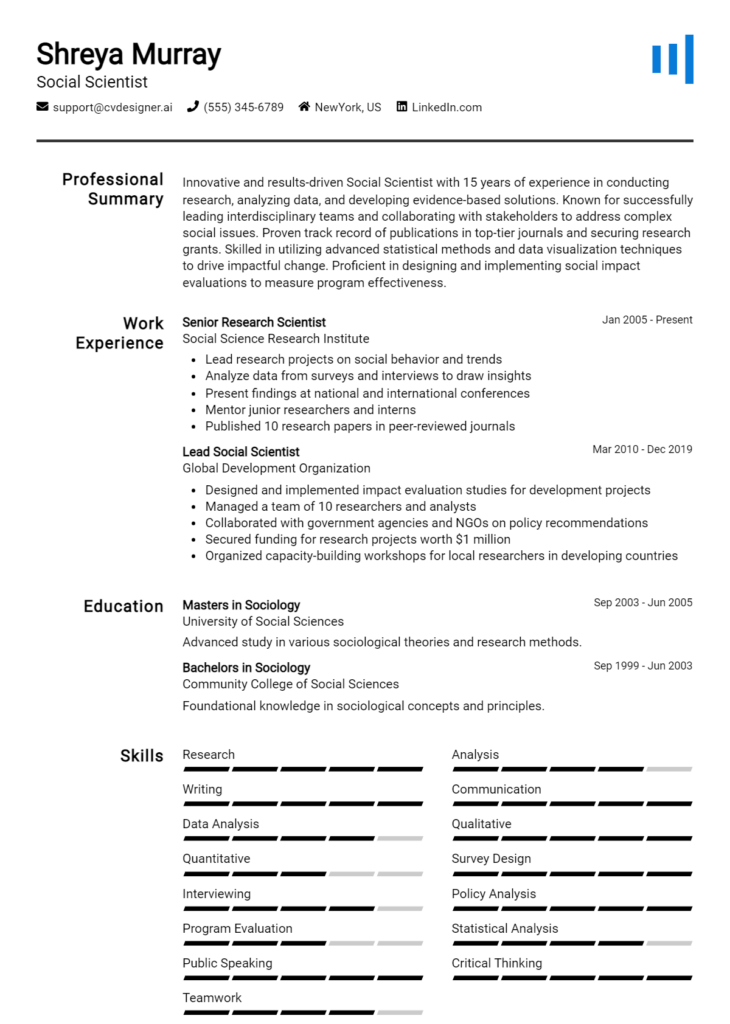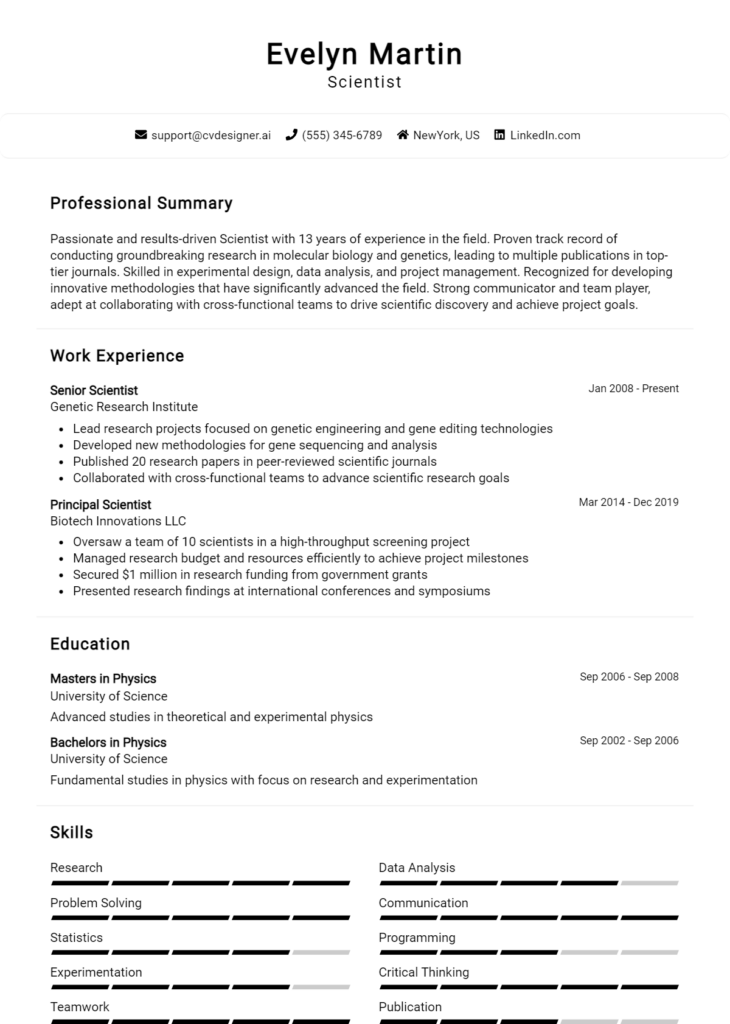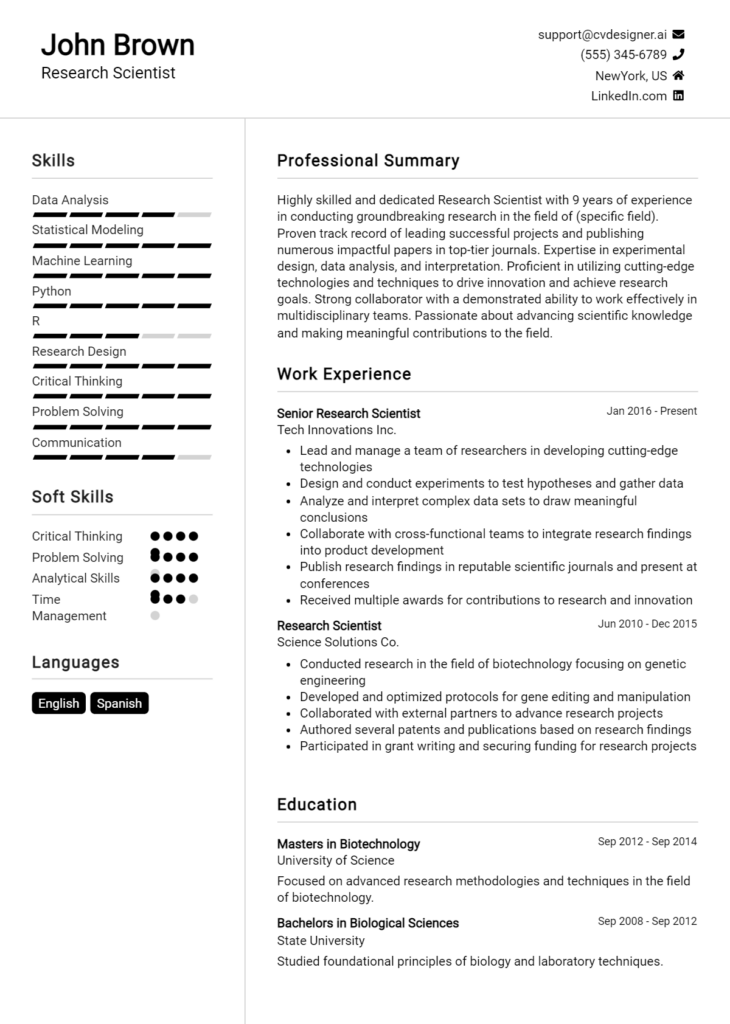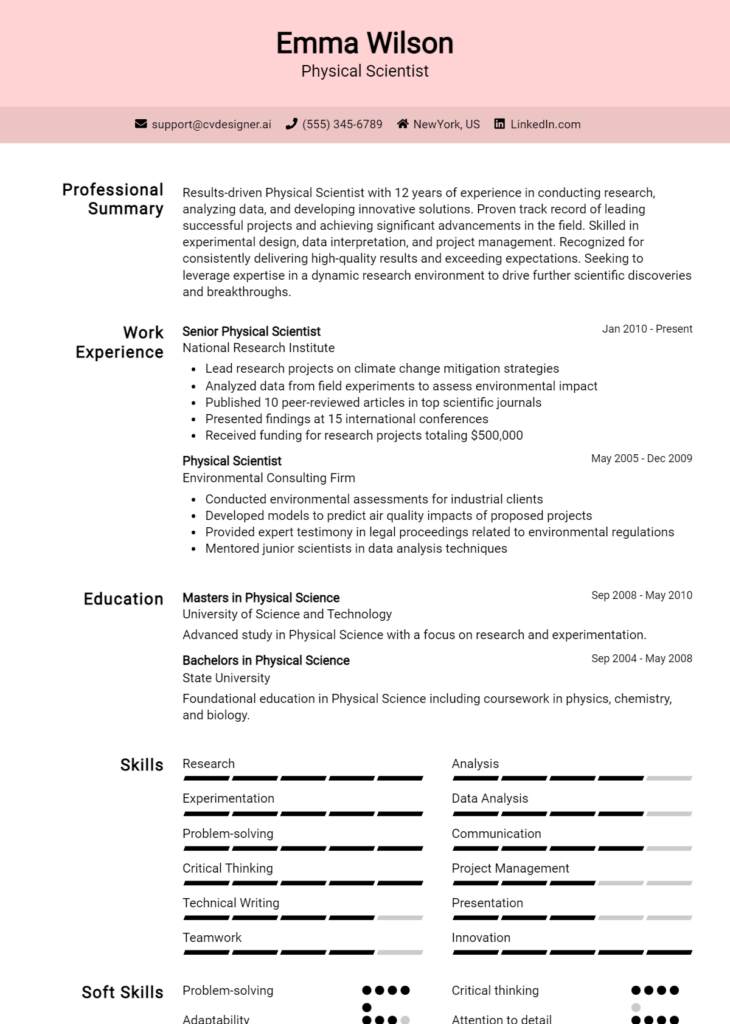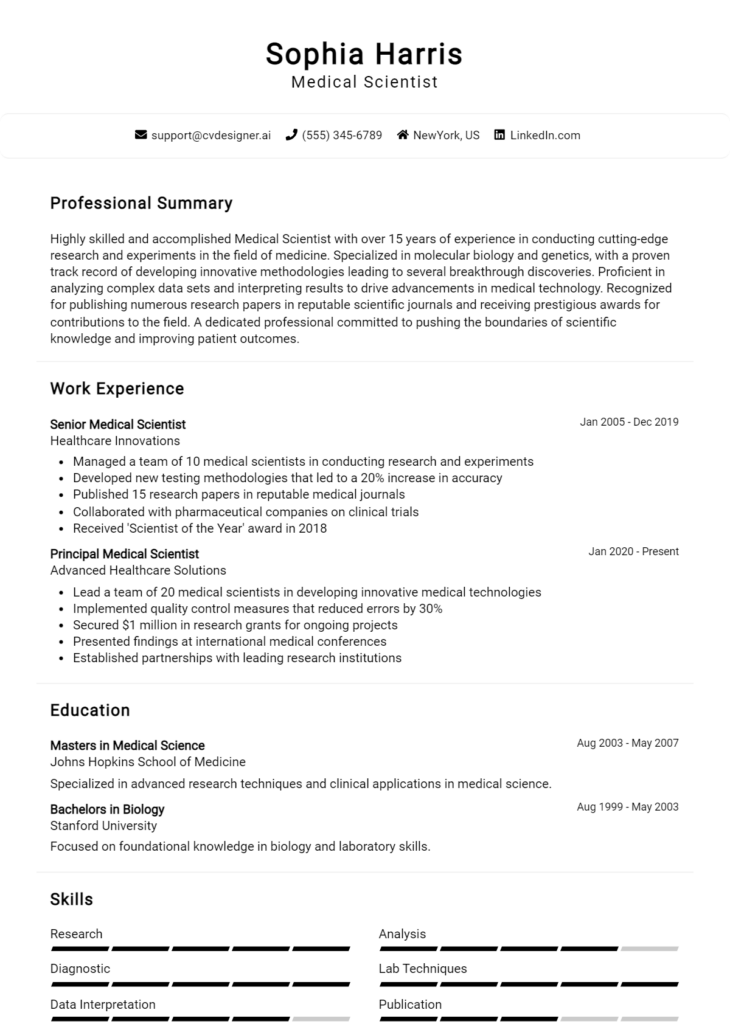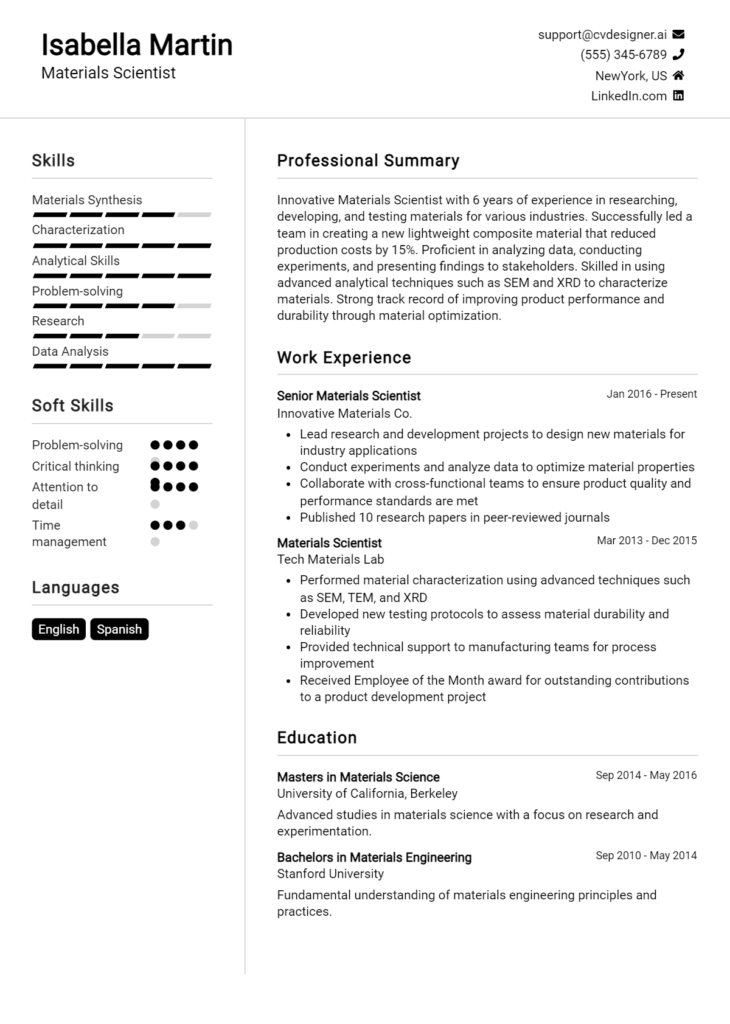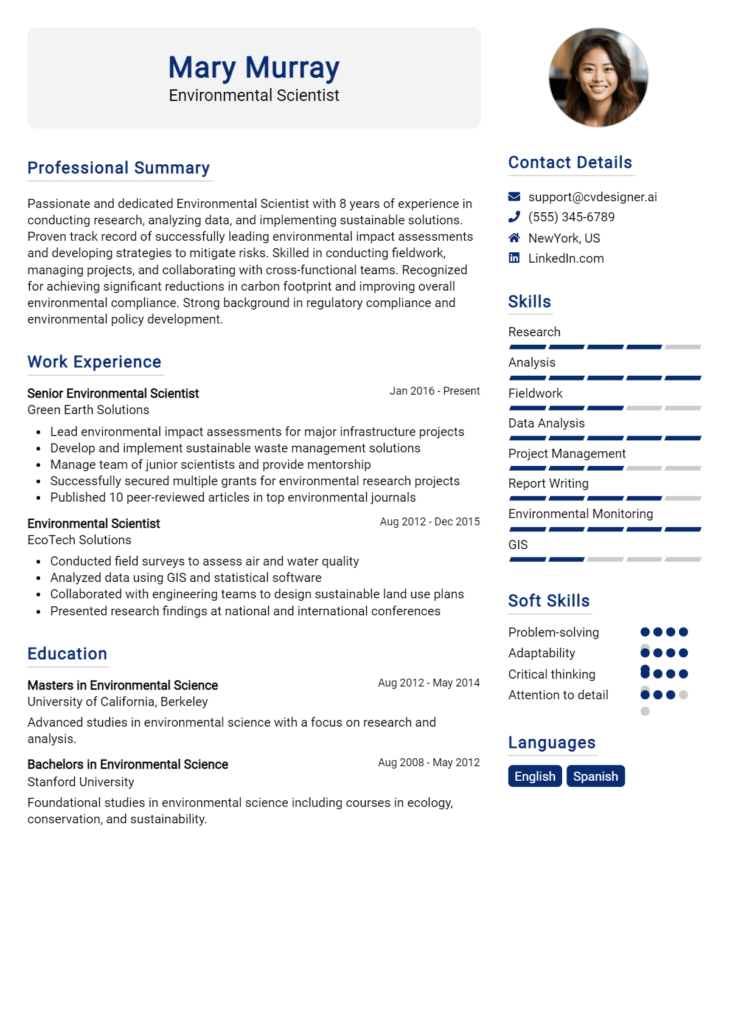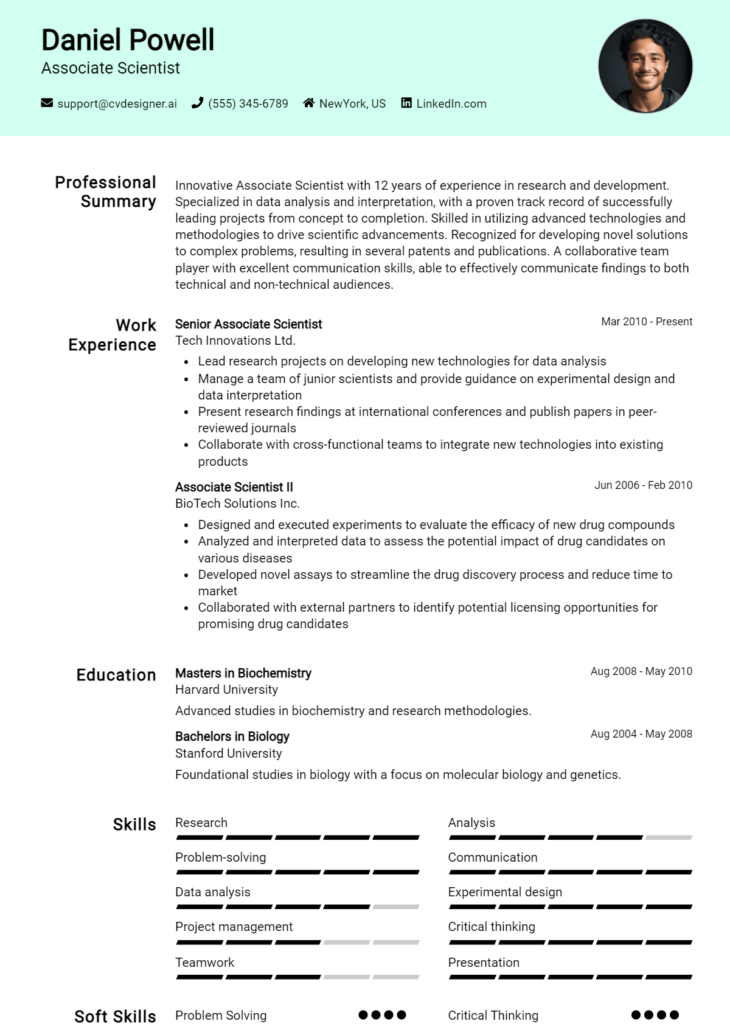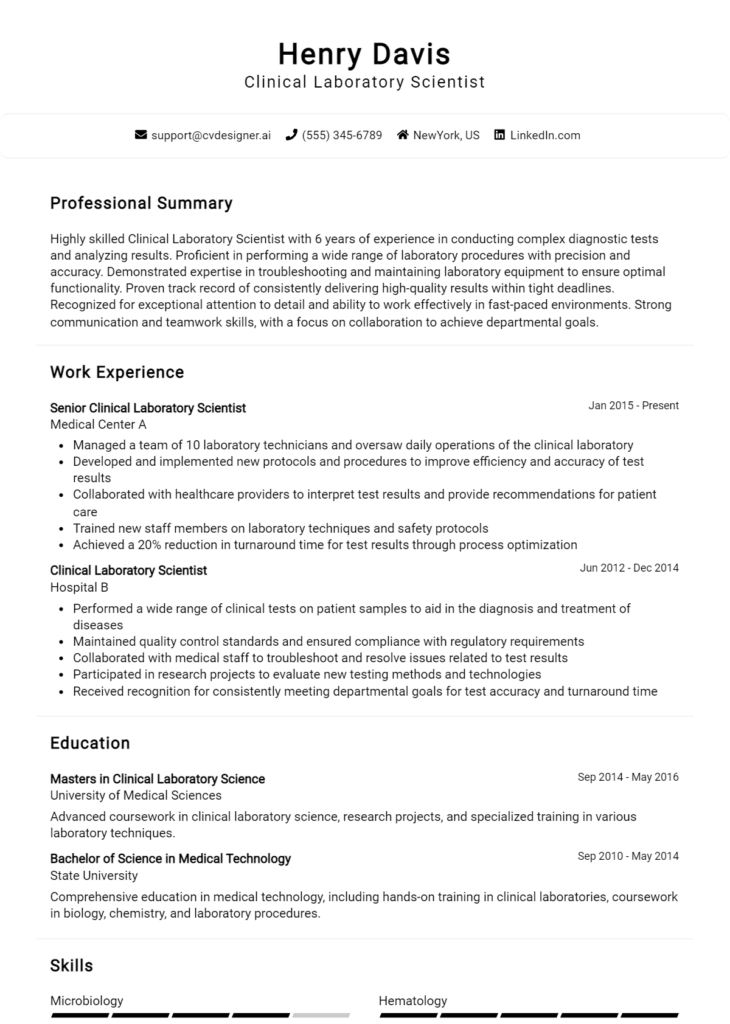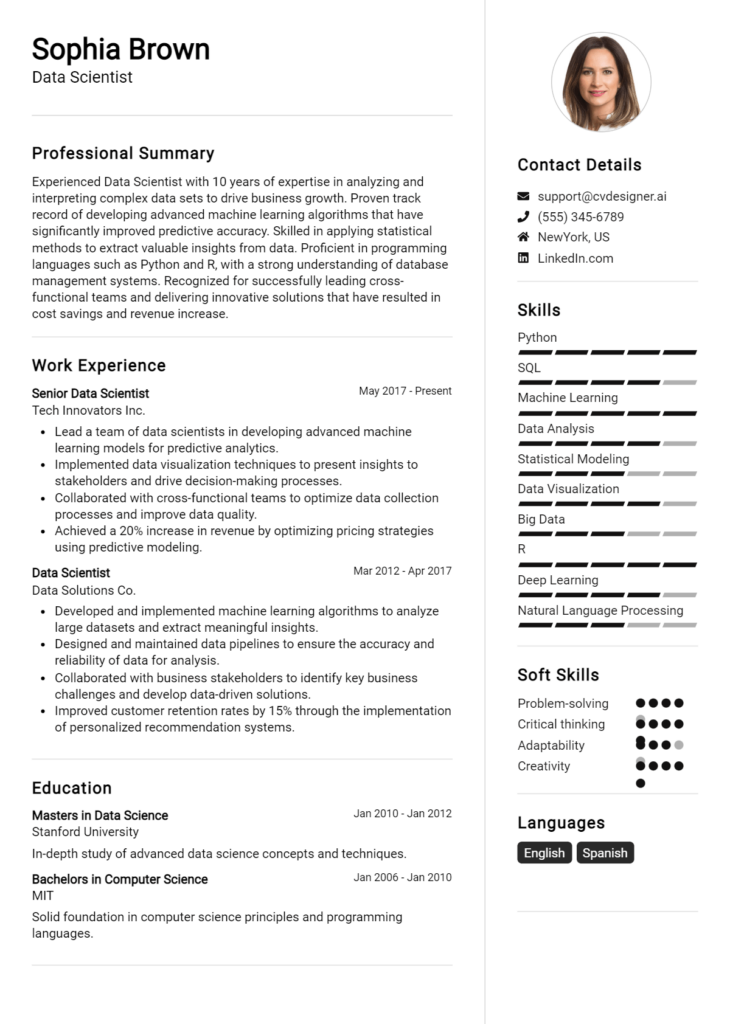Most Popular Analytical Scientist Resume Examples
Explore additional Analytical Scientist resume samples and guides and see what works for your level of experience or role.
As an Analytical Scientist, you play a pivotal role in the scientific community, utilizing advanced techniques to analyze data and draw meaningful conclusions that drive innovation and inform critical decisions. Your expertise in laboratory practices, data interpretation, and problem-solving not only contributes to groundbreaking research but also ensures compliance with regulatory standards. Given the competitive nature of the field, having a well-crafted resume is essential to showcase your unique skills and experiences effectively. A compelling resume can set you apart from other candidates, highlighting your qualifications and achievements in a way that resonates with potential employers.
In this comprehensive guide, we will delve into the essential components of an effective Analytical Scientist resume. You'll discover the key responsibilities and skills that employers are seeking, along with the best formats to present your information. We’ll also highlight common mistakes to avoid that could undermine your chances of landing an interview. To cater to professionals at all levels, we'll provide tailored resume examples and actionable tips on resume writing best practices. Additionally, we’ll guide you in selecting the right resume templates that align with your personal brand and career goals. Whether you are just starting your career or looking to advance in the field, this guide will equip you with the tools you need to create a standout resume that captures attention and opens doors.
Key Responsibilities and Skills for a Analytical Scientist
As an Analytical Scientist, you play a crucial role in the research and development process, focusing on the analysis of substances to aid in the discovery and formulation of new products. Your key responsibilities typically include conducting experiments, developing and validating analytical methods, analyzing data, and collaborating with cross-functional teams to ensure quality and compliance. You also need to interpret results and present findings, contributing to scientific reports and publications.
To excel in this role, certain skills are essential:
- Analytical Thinking: Ability to interpret complex data and draw meaningful conclusions.
- Technical Proficiency: Familiarity with analytical instruments (e.g., HPLC, GC, mass spectrometry) and software used for data analysis.
- Attention to Detail: Precision in conducting experiments and reporting results.
- Problem-Solving Skills: Capacity to troubleshoot and optimize analytical methods.
- Communication Skills: Proficient in presenting data clearly and effectively to diverse audiences.
- Team Collaboration: Ability to work well within multidisciplinary teams and contribute to group goals.
- Regulatory Knowledge: Understanding of compliance standards relevant to the industry (e.g., GLP, GMP).
Highlighting these skills effectively in the resume skills section is vital, as it allows potential employers to quickly gauge your qualifications. Tailoring both the responsibilities and skills to match the specific job description enhances your chances of standing out among applicants. Additionally, consider how these skills can be emphasized in creating a compelling CV that showcases your expertise and aligns with the job requirements. This strategic approach not only showcases your qualifications but also demonstrates your understanding of the role and its demands.
Best Resume Format and Structure for a Analytical Scientist
When crafting a resume for the Analytical Scientist role, the right format can significantly enhance your chances of standing out to hiring managers. The following guide outlines the recommended structure and key sections to include in your resume.
Contact Information
- Name: Use a larger font for your name to make it stand out.
- Phone Number: Ensure it’s a professional voicemail.
- Email Address: Use a professional email address (ideally your name).
- LinkedIn Profile: Include a link to your LinkedIn profile if it’s well-maintained.
- Location: City and state are sufficient; you don’t need to include your full address.
Professional Summary
- Keep this section concise, ideally 3-4 sentences.
- Focus on your experience in analytical chemistry, your key skills, and what you can bring to the company.
- Tailor this summary to reflect the requirements of the job you’re applying for.
Work Experience
- Job Title: Clearly state your job title.
- Company Name and Location: Include the name of the employer and its location.
- Dates of Employment: Use the format "Month Year – Month Year."
- Responsibilities and Achievements: Use bullet points to list your key responsibilities and achievements. Start each bullet with an action verb and quantify results when possible (e.g., "Developed a novel method that increased analysis efficiency by 30%").
Education
- Degree(s): List your degrees (e.g., B.Sc. in Chemistry).
- Institution Name and Location: Include the name of the university and location.
- Graduation Date: Provide your graduation date.
- Relevant Coursework: If applicable, you can include relevant courses to showcase your expertise.
Skills
- Focus on both hard and soft skills relevant to the Analytical Scientist position.
- Examples of hard skills may include techniques like HPLC, GC-MS, titration methods, and statistical analysis.
- Soft skills could include critical thinking, problem-solving, and communication.
- Consider using a bullet-point list for clarity.
Certifications
- List any relevant certifications (e.g., Certified Quality Auditor, Six Sigma).
- Include the certifying body and the date obtained.
- Make sure these certifications are relevant to the Analytical Scientist role.
Tips for Formatting
- Font and Size: Use a clean, professional font (e.g., Arial, Calibri) in 10-12 point size.
- Margins: Keep margins around 0.5 to 1 inch for a neat appearance.
- Length: Aim for one page unless you have extensive experience that justifies a second page.
- Bullet Points: Use bullet points for easy readability, especially in the Work Experience and Skills sections.
- Consistent Formatting: Ensure headings, font sizes, and spacing are consistent throughout the document.
This resume format can effectively complement a corresponding cover letter. Your cover letter can provide a narrative that ties your experiences together and showcases your passion for the role, while your resume offers a structured overview of your qualifications. Together, they can create a compelling application package that highlights your fit for the Analytical Scientist position.
Writing Tips and Best Practices for a Analytical Scientist Resume
Crafting a compelling resume as an Analytical Scientist requires a strategic approach that highlights your technical skills, relevant experience, and accomplishments in a clear and professional manner. To make your resume stand out, focus on tailoring it to the specific job you are applying for by incorporating industry-specific keywords and phrases. Utilize action verbs to convey your contributions effectively, and quantify your achievements to demonstrate the impact of your work. Remember, a polished resume can significantly enhance your chances of landing an interview, so consider utilizing resume writing tips for a professional presentation. Additionally, the same practices should be applied when drafting a cover letter to ensure a cohesive application.
- Use action verbs such as "analyzed," "developed," "optimized," and "executed" to start bullet points.
- Quantify your achievements by including metrics, such as "increased efficiency by 20%" or "managed a budget of $50,000."
- Tailor your resume for each application by including relevant keywords from the job description.
- Highlight your technical skills, such as proficiency in specific analytical techniques or software.
- Include a summary statement that encapsulates your expertise and career goals in a few sentences.
- Keep your resume concise, ideally one page, focusing on the most relevant experiences.
- Organize your information clearly with distinct sections such as Education, Experience, Skills, and Certifications.
- Proofread for grammatical errors and ensure consistency in formatting to present a polished document.
Common Mistakes to Avoid in a Analytical Scientist Resume
When crafting a resume for an Analytical Scientist position, it's crucial to present your qualifications and experiences clearly and concisely. Many candidates, however, fall into common traps that can undermine their chances of making a strong impression. Avoiding these pitfalls will not only enhance the effectiveness of your resume but also reflect your professionalism. Here are some common mistakes to steer clear of:
- Overloading the resume with excessive information, making it difficult for hiring managers to quickly identify key skills and experiences.
- Using generic descriptions that fail to highlight specific accomplishments or contributions in previous roles.
- Neglecting to tailor the resume to the specific job description, which can make it appear as if you lack genuine interest in the position.
- Including irrelevant information, such as hobbies or outdated skills, that do not pertain to the Analytical Scientist role.
- Failing to quantify achievements, which can make it harder for employers to gauge the impact of your work.
- Using jargon or overly technical language that may not be understood by all readers, particularly those in HR.
- Ignoring formatting and organization, resulting in a cluttered or hard-to-read document.
- Omitting key sections such as education, certifications, or relevant coursework that showcase your qualifications.
- Not proofreading for grammar or spelling errors, which can leave a negative impression about your attention to detail.
- Failing to provide contact information or including an unprofessional email address.
To ensure your resume stands out for all the right reasons, consider reviewing the common mistakes to avoid in a resume. Furthermore, don’t forget to also examine common cover letter mistakes to ensure that all your application materials are polished and professional.
Sample Analytical Scientist Resumes
An Analytical Scientist plays a crucial role in research and development, applying scientific principles and techniques to analyze data and solve complex problems. Whether you are an experienced professional ready to take the next step in your career, an entry-level candidate eager to make your mark, or someone transitioning from a different field, having a well-crafted resume is essential. Below are three sample resumes tailored to different career stages in the analytical science field.
Experienced Professional Resume
Jane Doe
[City, State]
[Phone Number]
[Email Address]
Professional Summary
Dedicated and detail-oriented Analytical Scientist with over 8 years of experience in pharmaceutical research and development. Proven expertise in method development, validation, and data interpretation. Strong background in chromatography and spectroscopy techniques with a commitment to maintaining the highest quality standards.
Education
Ph.D. in Analytical Chemistry
University of Science, City, State
Graduated: May 2015
Skills
- Method Development & Validation
- Chromatography (HPLC, GC)
- Spectroscopy (NMR, UV-Vis)
- Data Analysis (Statistical Software, MATLAB)
- Team Leadership & Training
Professional Experience
Senior Analytical Scientist
XYZ Pharmaceuticals, City, State
June 2018 – Present
- Lead a team of 5 in the development and validation of analytical methods for new drug formulations.
- Collaborate with cross-functional teams to support product development from concept through commercialization.
- Conduct training sessions for junior scientists on advanced analytical techniques.
Analytical Scientist
ABC Labs, City, State
June 2015 – May 2018
- Developed and optimized analytical methods for quality control testing.
- Performed data analysis and presented findings to stakeholders.
- Participated in regulatory submissions and compliance audits.
Entry-Level Candidate Resume
John Smith
[City, State]
[Phone Number]
[Email Address]
Objective
Enthusiastic and detail-oriented recent graduate with a Bachelor’s degree in Chemistry, seeking an entry-level position as an Analytical Scientist. Eager to apply laboratory skills and knowledge of analytical techniques to contribute to innovative research.
Education
B.S. in Chemistry
University of Science, City, State
Graduated: May 2023
Skills
- Proficient in HPLC and GC
- Strong quantitative and qualitative analysis skills
- Familiar with laboratory safety protocols
- Excellent communication and teamwork abilities
Internship Experience
Laboratory Intern
XYZ Research Institute, City, State
June 2022 – August 2022
- Assisted in the development of analytical methods for environmental samples.
- Conducted experiments and analyzed data under the supervision of senior scientists.
- Maintained laboratory equipment and ensured compliance with safety standards.
Research Project
University of Science, City, State
January 2023 – April 2023
- Conducted research on the effects of temperature on reaction rates using kinetic studies.
- Presented findings at the university’s annual research symposium.
Career Changer Resume
Emily Johnson
[City, State]
[Phone Number]
[Email Address]
Summary
Results-driven professional with a background in quality assurance and a passion for analytical science. Possesses strong problem-solving skills and is seeking to leverage previous experience in a new role as an Analytical Scientist.
Education
B.S. in Biology
University of Science, City, State
Graduated: May 2018
Additional Coursework
- Analytical Chemistry
- Instrumental Analysis
Skills
- Quality Control & Assurance
- Strong Analytical Skills
- Familiar with Laboratory Techniques
- Proficient in Data Analysis Software
Professional Experience
Quality Assurance Specialist
ABC Manufacturing, City, State
June 2018 – Present
- Conducted quality assessments and audits to ensure compliance with industry standards.
- Collaborated with cross-functional teams to improve product quality and reduce defects.
- Developed training materials and conducted workshops for new employees on quality protocols.
Volunteering Experience
Local Environmental Agency, City, State
June 2021 – Present
- Assisted in water quality testing and analysis for local water bodies.
- Engaged in community education about environmental conservation and safety.
For those seeking further inspiration, consider exploring more resume templates. Additionally, corresponding cover letter examples can help you create a complete job application package, enhancing your chances of landing that desired role in analytical science.
Checklist for a Analytical Scientist Resume
- Proofread for Errors: Carefully read through your resume multiple times to catch any spelling, grammar, or punctuation mistakes. Consider using tools like spell checkers or grammar checkers for an additional layer of scrutiny.
- Consistency in Formatting: Ensure that the font type, size, and spacing are consistent throughout the document. This includes headings, bullet points, and margins, which should all follow the same style.
- Tailor Your Content: Customize your resume for each job application by highlighting relevant skills, experiences, and accomplishments that align with the specific requirements of the Analytical Scientist role.
- Use Action-Oriented Language: Start bullet points with strong action verbs to convey your achievements effectively (e.g., "Developed," "Analyzed," "Optimized").
- Quantify Achievements: Whenever possible, include metrics or specific outcomes to demonstrate the impact of your work. For example, “Improved process efficiency by 20% through innovative analytical methods.”
- Highlight Relevant Skills: Make sure to include both technical and soft skills that are pertinent to the Analytical Scientist position, such as data analysis, laboratory techniques, and teamwork.
- Include Relevant Certifications: If applicable, list any certifications or training that enhance your qualifications for the role, such as Good Laboratory Practice (GLP) or Six Sigma.
- Contact Information: Ensure your contact details are accurate and up to date, including your phone number, email address, and LinkedIn profile.
- Seek Feedback: Before finalizing your resume, consider asking a colleague or mentor in the field to review it. They may provide valuable insights and suggestions for improvement.
Utilize an AI resume builder to ensure all elements are well-organized and visually appealing. A similar checklist can also be followed for creating a CV or cover letter.
Key Takeaways for a Analytical Scientist Resume Guide
In conclusion, crafting a standout resume as an Analytical Scientist requires attention to detail and a clear presentation of your skills and experiences. By utilizing the examples and tips provided, you can create a compelling resume that effectively showcases your expertise in data analysis, problem-solving, and scientific research. To take the next step in your job application process, consider downloading a customizable resume template from resume templates or explore our selection of cover letter templates to complement your application. For a more tailored approach, our best resume maker can help you design a professional resume in minutes. Additionally, following similar guidelines will be beneficial when crafting a strong CV and an engaging cover letter. Embrace these resources to enhance your job search and position yourself as a top candidate in the analytical sciences field.
